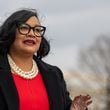Falcons General manager Thomas Dimitroff and coach Dan Quinn want to make the most of their southeastern advantage.
So far, so good.
The team used four of its six picks in the 2018 NFL Draft this weekend on deep south products. First-round wide receiver Calvin Ridley and third-round defensive tackle Deadrin Senat hail from Florida. Fourth-round running back Ito Smith is from Alabama. Sixth-round special teams ace Russell Gage is from Louisiana.
“The coolest part about living down here is we are in football country in the SEC,” Quinn said. “That’s Florida, Georgia, South Carolina, Tennessee, LSU. Man, this is where it’s at. You can see that happens in the draft, happened in the first round.”
Quinn and Dimitroff’s first pick together was Vic Beasley, a Georgia-born pass rusher, in 2015. They followed with LSU cornerback Jalen Collins in the second round, and while that didn’t work out, they stole Grady Jarrett in the fifth round, a Clemson defensive tackle born in Conyers, Georgia, and son of Falcons great Jessie Tuggle.
The Falcons doubled down the next draft, taking Florida safety Keanu Neal and LSU linebacker Deion Jones, both of whom blossomed into defensive leaders.
“We know this region pretty well,” Quinn said. “Not only from living here but Thomas and his guys scouting here. He can tell you, being a scout in the southeast, as a college scout, is where it’s at.”
Prior to Quinn, Dimitroff found several foundational players from southern schools: Jake Matthews (Texas A&M), Devonta Freeman (FSU), Robert Alford (Southeastern Louisiana) and Julio Jones (Alabama).
Ridley’s selection signals an attempt to revive the 2016 scoring offense that carried the team to a Super Bowl. With defenses prioritizing fellow Crimson Tide product Jones, Ridley should have room to work on the other side, providing more of a threat with Mohamed Sanu.
While the Alabama receivers are now key cogs of the offense, LSU has been the biggest beneficiary of the Falcons’ philosophy. Since Quinn’s arrival, the Falcons have taken a Tiger in every draft: Collins, Jones, linebacker Duke Riley and Gage.
Quinn said it’s more coincidental, but it’s easy to see why they’d admire LSU players. Dimitroff agreed.
“There are so many athletes that are coming out of that program,” Dimitroff said. “Even guys who aren’t at the starting end of their position. In this situation with Russell, he lives and breathes football through and through. He is an athlete, a natural versatile athlete. We’ve taken other people who have the same versatile traits.”
Gage will compete for a roster spot in training camp. His versatility as a receiver, special-teams gunner and returner will help his case.
And perhaps so will his relationship with Jones and Riley.
“That’s my boy,” Gage said of Jones. “Me and him go way back. When I first got to LSU, he was one of those guys I followed. It’s nice to be reunited with him. … LSU, we’re really tight. That’s a brotherhood. It’s great to be with those two guys. That’s two hard-working guys. I’m excited.”
Dimitroff’s Falcons have spent five of their eight first selections on southern prospects. They’ve invested six first or second rounders on southerners since 2015.
As a recent result, Jones, Neal, Beasley, Riley and Ridley are among young pillars for the Falcons’ future.
“No question, the southeast is a breathing ground for a lot of fantastic football players and athletes,” Dimitroff said.
About the Author






